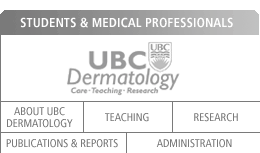|
 |
 |
 |
Trained dermatologists may combine several activities - seeing patients in public hospital clinics and/or in private practices, acting as consultants to other specialists, teaching, and participating in clinical research.
Dermatologists must have a working knowledge in basic sciences including microbiology, pathology, biochemistry, physics, physiology, and endocrinology. They must be familiar with all the other medical specialties because of their consultant work and because many skin diseases are associated with internal conditions.
Dermatologists perform skin surgery in many situations:
- To prevent or provide early control of disease, e.g. remove skin cancer.
- To improve the skin's appearance by removing growths, discolourations, or damage caused by ageing, sunlight or disease.
- To establish a definite diagnosis (biopsy).
Dermatologists perform many specialized diagnostic procedures including:
- microscopic examination of skin biopsy specimens
- cytological smears
- patch tests
- photo tests
- potassium hydroxide (KOH) preparations
- fungus cultures
- and other microbiologic examination of skin scrapings and secretions.
Treatment methods used by dermatologists include:
- externally applied, injected, and internal medications
- selected x-ray and ultraviolet light therapy
- a range of dermatologic surgical procedures.
- laser and light therapies
|
|
 |
|

